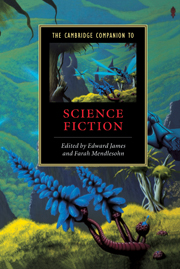Book contents
- Frontmatter
- Introduction
- Part 1 The history
- Part 2 Critical approaches
- Part 3 Sub-genres and themes
- 11 The icons of science fiction
- 12 Science fiction and the life sciences
- 13 Hard science fiction
- 14 Space opera
- 15 Alternate history
- 16 Utopias and anti-utopias
- 17 Politics and science fiction
- 18 Gender in science fiction
- 19 Race and ethnicity in science fiction
- 20 Religion and science fiction
- Further Reading
- Index
- Series List
17 - Politics and science fiction
from Part 3 - Sub-genres and themes
Published online by Cambridge University Press: 28 May 2006
- Frontmatter
- Introduction
- Part 1 The history
- Part 2 Critical approaches
- Part 3 Sub-genres and themes
- 11 The icons of science fiction
- 12 Science fiction and the life sciences
- 13 Hard science fiction
- 14 Space opera
- 15 Alternate history
- 16 Utopias and anti-utopias
- 17 Politics and science fiction
- 18 Gender in science fiction
- 19 Race and ethnicity in science fiction
- 20 Religion and science fiction
- Further Reading
- Index
- Series List
Summary
There are no politics in Utopia; as in its neighbour Dystopia, the government of people has been replaced by the administration of things. To many observers, this state of affairs implies anything but freedom. It is the absence of political debate, as much as the absence of privacy and the relentless presence of morality, that makes the communism of Anarres, in Ursula Le Guin's anarchist classic The Dispossessed (1974), so oppressive. When her hero Shevek finds himself in conflict with aspects of his society he has no forum in which to express it, no way to find like-minded individuals with whom he might find common ground; instead, his conflicts become conflicts with other individuals. He is as isolated as any dissident in a totalitarian state.
For a Western tradition of political thought which begins with Aristotle and continues through such diverse philosophers as the conservative Edmund Burke, the radical Thomas Paine, the liberal Lord Macaulay, the communist Antonio Gramsci, the socialist Tony Polan and the social democrat Bernard Crick, politics provides the forum to which free people – not always, of course, a majority of the adult populace – bring their conflicts of collective interest for peaceful resolution. For most of these thinkers the forum is as central an institution of a free society as the market and the court of law, and the interaction of politics, economics and justice is the substance of public life.
- Type
- Chapter
- Information
- The Cambridge Companion to Science Fiction , pp. 230 - 240Publisher: Cambridge University PressPrint publication year: 2003
- 7
- Cited by

